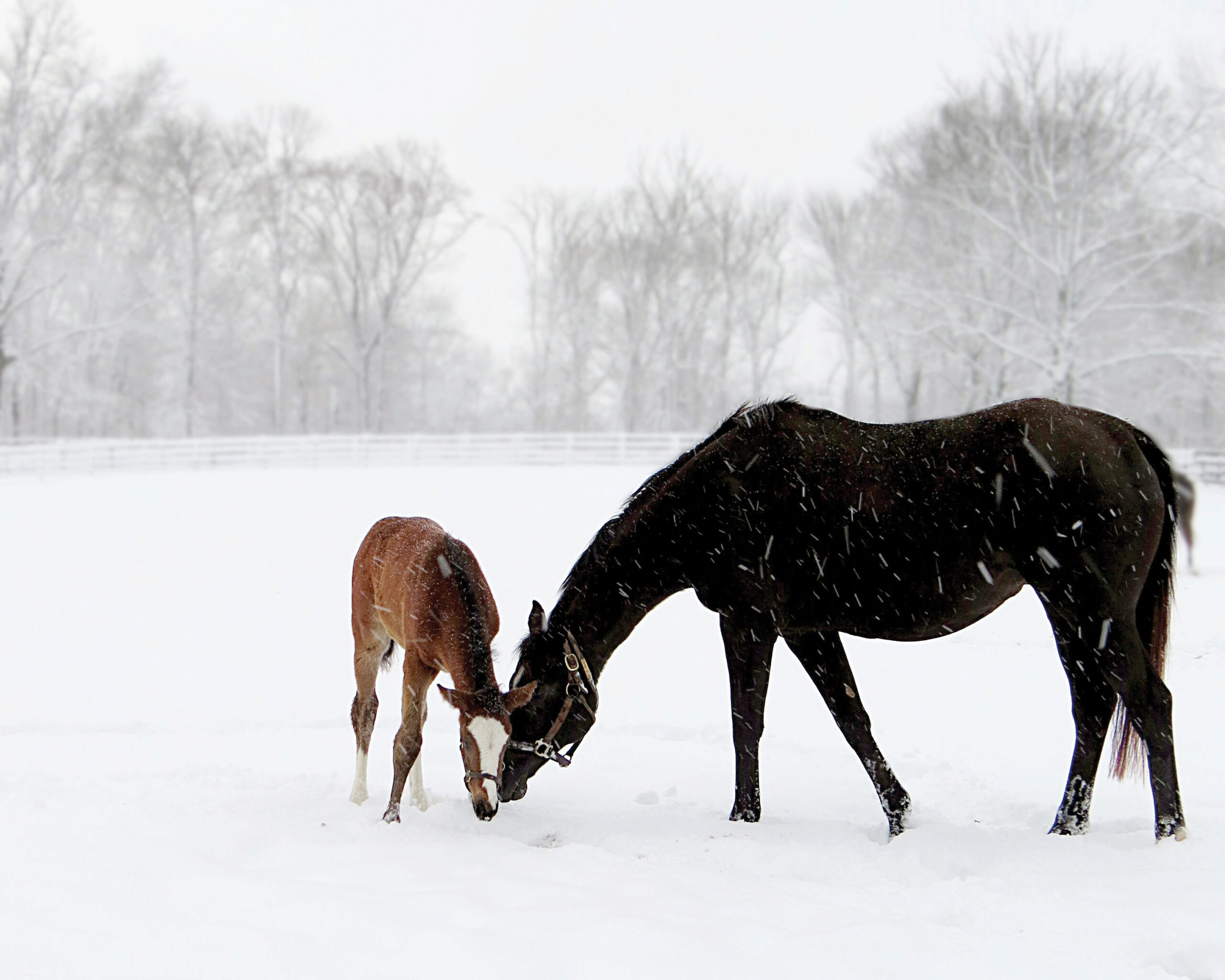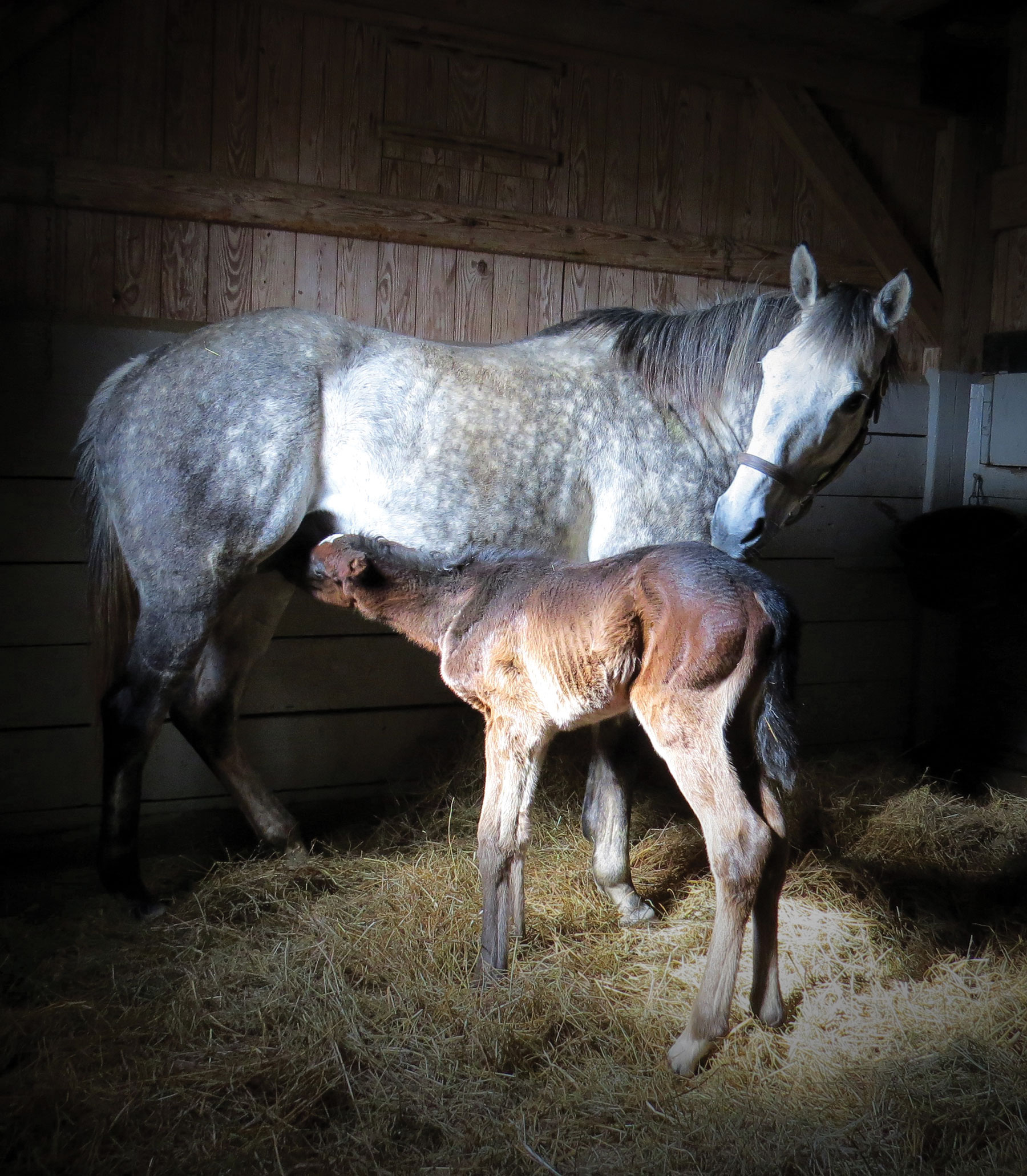Heroes of Tomorrow: Witnessing the Miracle of Birth on a Thoroughbred Farm

Written by Sarah Hickner | Photos courtesy of Hermitage Farm
Before I wound up here in Northern Virginia, I was a horse-hungry college kid. It had been a year and a half since I moved to Louisville, and my hunger had only grown. I wanted to experience everything in the world of horse racing. When an email hit my inbox from the University of Louisville Equine Department advisor, stating that a local Thoroughbred breeding farm was seeking an intern, I filled out and returned the application within the hour.
I had been on the backside of the track plenty since coming to Louisville, and had even galloped some. The reverence with which those horsemen spoke about certain stallions, broodmares, and foals created an allure that pulled me in. Two weeks later, I was bumping along the asphalt drive of Hermitage Farm with its imposing mansion and trademark red trimmed black barns. Big-bellied mares grazed in the fields, not even glancing at the newcomer. The vet, Dr. John, squinted and grinned politely under his bushy mustache as I jumped down from the truck. It was foaling season, and he was ready to get to work.
We climbed into his hunter green Suburban and set out to check the mares. Hermitage Farm stretched across nearly 700 acres. We had a lot of ground to cover. At each barn we got out, he grabbed his ultrasound supplies, I had the wooden twitch, and we went in. Some mares were large with foals, irritable and ready to be left alone. Others were checked for heat cycles to see if it was time to be bred.

With arms extended out, my left hand held the handle of the twitch twisted around her nose, and my right hand held her tail to keep it out of the way. The vet donned a fresh plastic glove that went all the way to his shoulder, and he went to work. At this point in life, I was seriously considering veterinary school, but it didn’t take too many times of watching Dr. John bury his arm up to the shoulder for me to decide reproductive work would not be my specialty — even if the vet spent half the year playing polo and vacationing.
Soon the foals started to drop. Some arrived perfectly and easily as expected. A couple literally dropped — not just the slang term. The mare was walking down the aisle of the barn when the foal just came out! One mare was let out to graze for an hour, because she was on heavy foal watch, and when the grooms went to grab her there was a wobbly legged addition. Then there were the mares who were “waxed over” for what seemed like weeks. Surely the baby was coming today! But the mare or baby was stubborn and held out until everyone nearly gave up.
I marveled at how, no matter how much money they spent and how well monitored the broodmares were, birth still happened in its own unique way and time.
I had the privilege of being present for a couple births. My whole life I had heard people tell sappy stories about the miracle of birth. I thought this might be the event that changed my life. I may never be the same after witnessing a baby Thoroughbred be born. Just like the movies, the mare was laying down with her head up, pushing and stressed. The guys had their supply boxes and air tanks in preparation. As the foal started to emerge, the farm manager helped pull the newborn out onto the straw bedding. It’s eyes seemed squeezed shut. It wasn’t ready to come out. It was so not ready, that it was refusing to take its first gulp of sweet air.
“Air tank!” the barn manager yelled. The guys quickly helped him attach the cone to the oxygen tank over the foal’s nose and massaged its neck. A few very long seconds later, and he began to breathe and opened his eyes to greet the world. No one seemed particularly stressed.
The next birth I saw was similar. Oxygen was administered, her throat was massaged, and the foal opened her eyes. The men grabbed the bloody placenta with no qualms and tossed it in a bucket. Back at the vet building, Dr. John stretched it out and checked for holes or pieces missing. There never were any. It would make someone with a weaker stomach sick. Good thing none of us had weak stomachs.

Within a couple of days, the knobby-kneed newborns were rearing and attempting to play with me in the stall, as I stood defenseless. My arms were outstretched holding the twitch in one hand and the tail in the other, while Dr. John checked on the momma, and I giggled to assuage the fear.
Defending myself with a single foot while the vet moved as fast as possible, I finally got it. These little cocky foals were the Thoroughbred heroes of tomorrow. Maybe they would be stakes champions, possibly a Derby contender or winner, and eventually, hopefully, the sires and dams of heroes to come. If they failed on the track, they would find their way to riders like me who love to take horses from the track and find them a new career. ML
Published in the March 2021 issue of Middleburg Life.




